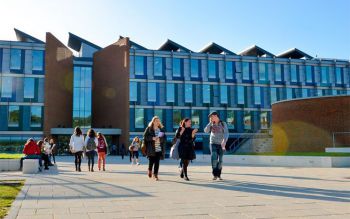Staff survey: Business School focuses on fairness and future proofing career development
Posted on behalf of: Catherine Liston-Hayes, Professor of Business and Government
Last updated: Wednesday, 5 June 2024

With over 5,000 students, 350 staff (including faculty and Professional Services), five departments, and several research centres, there is naturally a diversity of viewpoints and preferences within the Business School about how it organises and manages itself. Anonymous feedback gathered through the staff survey helps the School understand and navigate different perspectives so it can act on the feedback it receives to improve working life for staff. Find out more about how the Business School is taking action:
Fairness and transparency around workload
While the survey responses highlighted many positive aspects of working life at the Business School, including the friendliness of colleagues and the flexible working policy, it also identified some concerns. Feedback indicated that some colleagues did not feel that the allocation of teaching was fair. To address this, the School spent the past couple of years making sure that all departments followed the same workload principles and that all changes were discussed with workload management leads and approved by the senior management team before being implemented.
We also started to collaborate with a brilliant data analyst who is developing a new workload management template which will allow us to report more consistently on the distribution of work across departments, and longer term, across different categories of staff (including grade, gender, career pathway etc.). This will help us monitor more carefully who does what and hopefully correct any unfairness in the way teaching and admin roles are allocated, enhancing trust across departments.
Prioritising staff development and future proofing careers
We recognise that the higher education environment (and the world around us!) is changing rapidly and in significant ways. Staff are understandably concerned about their future career development and ensuring they have the skills to contribute to the University, and this is felt particularly by Professional Service colleagues. To address this, the School is actively encouraging PS staff to embrace AI and other development opportunities such as sustainability training.
Training on how colleagues can use AI in their work was delivered by Professor Paul Nightingale last year, explaining what AI entailed for the HE sector and how it can be used to support PS work, particularly in terms of automating tasks. The session was a great success with 45 PS staff taking part, many of whom are now making their work more manageable by using AI such as Microsoft CoPilot to produce drafts of web content, minutes, reports and more. We also organised a Festival of SustAInable Teaching and Learning on 8 May which welcomed both internal and external participants and was attended by academic and PS staff from the School. The day focused on inspiring our educators, and those who support them, to innovate in the area of AI and as part of this event, we invited Sophia, the first robot citizen of the world.
Four workshops on carbon literacy were delivered to our PS staff by three members of our faculty, Alexandra Pearson, Dr René Moolenaar and Dr Murtaza Faruquee, between March and July last year. This Sustainability Training Programme, certified by the Carbon Literacy Project, focused on developing the ability to identify, assess, and potentially replace activities that have a relatively high carbon footprint in the working day or at home. A total of 45 PS staff attended, and data will hopefully demonstrate the full impact of this training on the Business School in the coming year.
Recognising that those in senior academic roles can also benefit from career development, including tools and knowledge to deal with challenges that arise in the HE environment, the School encouraged five of its senior management team to enrol in the Academic Leadership Programme offered by the Organisational Development team. This programme, delivered over six weeks, focuses on self-reflection and the development of effective strategies to support and manage staff in their respective departments.
If you would like more information about these initiatives, please contact Catherine Liston-Hayes at: c.liston-heyes@sussex.ac.uk.
About our staff survey updates
Our monthly case studies highlight how Schools and Professional Services Divisions are using feedback from the staff survey to improve staff experience. You can view previous case studies on the staff survey webpage.
